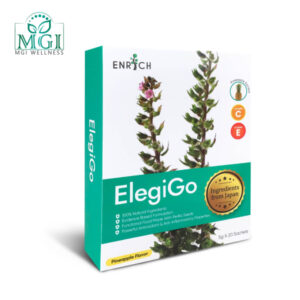Wellness
Possible to improve sinusitis with natural ingredients?
Many of us are suffering and keep on battling with allergies like sinusitis, allergic rhinitis, eczema, urticaria or contact dermatitis. These allergies can cause all kinds of irritating and unpleasant symptoms such as sneezing, stuffy/runny nose, sinus headache or intense skin itch, red and dry skin. Allergy symptoms can drain you, make you feel miserable and badly affect your daily life activities. Those sinusitis and skin allergies can be a chronic conditions where it may go away for a while, then flare up again. Sometimes, it can seem hopeless and make us feel depressed.
One of the most common and effective ways to lessen the severity of allergic symptoms is to reach for over-the-counter allergy relief drugs. These drugs block the chemical histamine which the immune system produces when a person is exposed to an allergen. However, these drugs only provide temporary relief and have negative side effects such as headache, fatigue, drowsiness and nausea.
As a result, many allergy-sufferers are searching for more natural ways that are healthier, longer-lasting and without side effects to treat their symptoms. Fortunately, there are certain natural ingredients could provide an alternative way to relief allergy symptoms and reduce recurrent allergic reaction.
Below are some amazing natural ingredients that can be used to provide relief for allergy symptoms.
-
Perilla Seed
Perilla frutescens, commonly called Perilla, is a green or purple annual herb, with a distinctive aroma and taste. Perilla seeds from perilla are traditionally used as spices and to make medicine. It has been traditionally used to promote healthy respiratory and immune function. The seeds are rich in flavonoid aglycones include polyphenols such as luteolin, quercetin, apigenin, chrysoeriol, and rosemarinic acid that possess anti-oxidants, anti-inflammatory and anti-histamine properties.
Study has shown perilla seed to be useful to battle against nasal congestion, sinusitis, allergic rhinitis, and allergic-related skin conditions like eczema and urticaria. Perilla seed polyphenols regulate allergic and inflammatory response due to its 5-lipoxygenase (promote inflammation) inhibitory activity and suppression of histamine release from mast cells. (1) Studies have shown the inhibitory efficacy of perilla seeds on histamine release is way stronger than that of sodium cromoglycate (anti-allergy medicine). (2)
In addition, perilla seed has shown free radical scavenging ability and suppression of allergic immunoglobulin. A high level of serum Immunoglobulin E (IgE) can be a sign that the body overreacts to allergens and this can lead to an allergic reaction. Studies showed that serum IgE levels were suppressed by administration of perilla seed extract, and allergic rhinitis, hay fever and urticaria were significantly improved in humans.(2) Research found that consumption of perilla seed extract (100-150mg/day) on patient with allergy for two weeks are proven to reduce allergic symptoms like sneezing, stuffed nose, blow nose and itchy skin. (3)
-
Quercetin
Quercetin is a polyphenol antioxidant that is naturally found in vegetables and fruits such as apples, berries, onions, broccoli and tomatoes. It helps naturally control allergy symptoms by inhibits the release of histamine and the formation of IgE antibodies. According to a 2020 study, it is proven that quercetin has anti-allergic functions that are known for inhibiting histamine production and pro-inflammatory mediators. (3) Thus, it is effective at reducing congestion in sinusitis because it helps calm down the hyperactivity of the airways.
Apart from that, another study found that supplementing with 500mg of quercetin a day helps lower levels of the inflammatory biomarker c-reactive protein (CRP) which is elevated in conditions like sinusitis and atopic dermatitis.(4) Moreover, quercetin has been shown to effectively reduce redness, itching, and inflammation of damaged skin due to allergies. It may also help restore skin barrier function, increasing hydration, and reducing water loss.(5)
-
Bromelain
Bromelain is an enzyme found in pineapple. Commonly know as a natural anti-histamine and a popular natural remedy for allergies. Bromelain has been studied for sinusitis and showed proven results for effectiveness in relieving sinus problems and reducing inflammation.
A pilot study of patients with chronic sinusitis published in 2013 found that taking 500 milligrams of bromelain six times a day for three months improved symptoms (postnasal drip, nasal obstruction, facial pain or pressure, headache) and quality of life. (6) Besides that, bromelain also helps decrease inflammation in the skin, soothes redness and itch from infected skin due to allergies.
In addition, consuming a nutritious diet and keep hydrated is important for keeping the immune system working at its best to manage allergies. A balanced diet including the consumption of fresh fruits and vegetables, whole grains, lean meats and fish and healthy fats. The nutrients they contain can help the body run at a healthy pace and aids you with allergies. Meanwhile, it is crucial to avoid known triggers. This is the best and most important way to prevent an allergic reaction, but not always easy or practical. Know your triggers and try to avoid them.
Suffering from allergies no matter sinusitis or skin allergies like eczema are never any fun and it can make your life miserable. In fact, allergies can’t be cured, but you can treat and control your symptoms. Thus, the goal of remedies is usually to relieve your symptoms. You may try to include the natural ingredients mentioned above to ease symptoms and reduce recurrent allergic reactions without causing drowsiness and reduce dependency on the anti-allergic drug.
References:
- Oh Ha, Park CS, Ahn HJ, et al. Effect of Perilla frutescens var. acuta Kudo and rosmarinic acid on allergic inflammatory reactions. EBM 2011;236(1):99-106.
- Perilla Seed Extract (Anti-allergy), Oryza Oil & fat Chemical Co.Ltd
- Morteza et al. Quercetin with the potential effect on allergic diseases. Allergy Asthma Clin Immunol (2020) 16:36
- M Mohammadi-Sartanget al. Effects of supplementation with quercetin on plasma C-reactive protein concentrations: a systematic review and meta-analysis of randomized controlled trials. Eur J Clin Nutr. 2017 Sep;71(9):1033-1039.
- Giada Maramaldi1et al. Soothing and anti-itch effect of quercetin phytosome in human subjects: a single-blind study. Clinical, Cosmetic and Investigational Dermatology 2016:9 55–62
- Büttneret al. Efficacy and tolerability of bromelain in patients with chronic rhinosinusitis – a pilot study. B-ENT, 2013, 9, 217-225
Health Food


